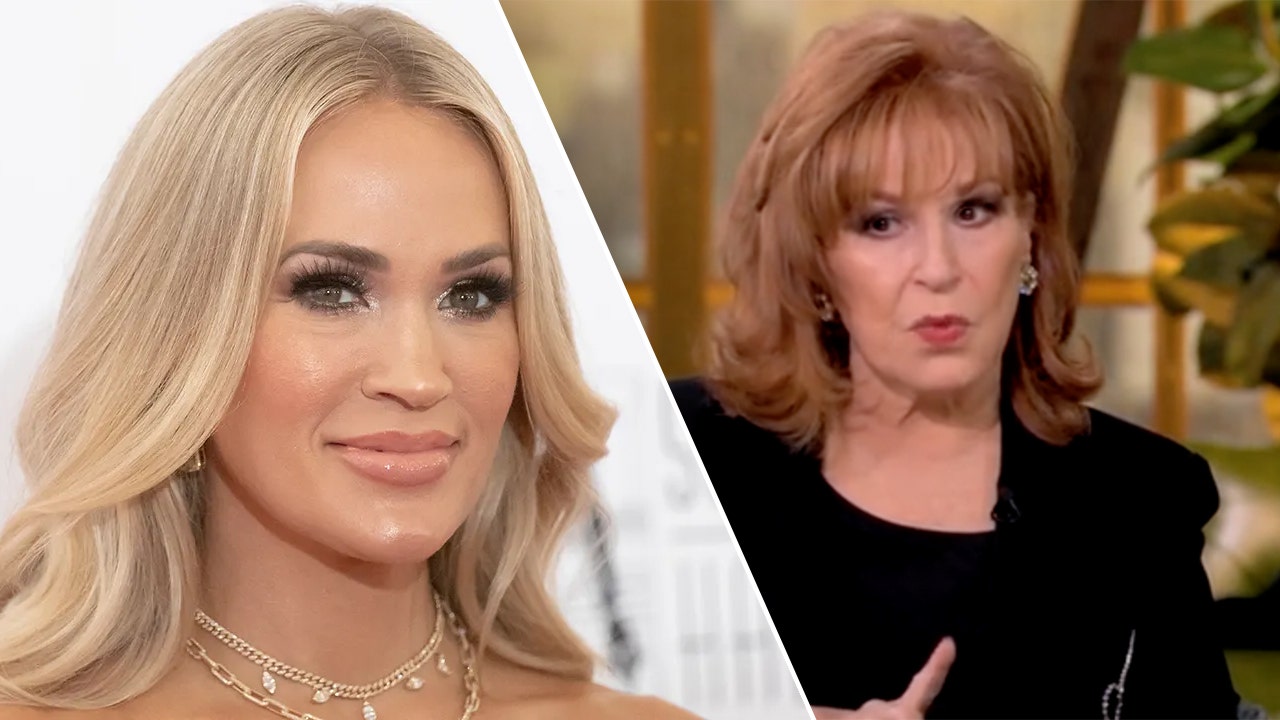Carrie Underwood and Joy Behar Clash Over Trump Inauguration Performance
In a heated moment on the January 14, 2025, episode of The View, co-host Joy Behar sparked a firestorm of controversy by criticizing country music superstar Carrie Underwood’s decision to perform at President-elect Donald Trump’s inauguration. The clash, rooted in differing views on patriotism and political alignment, has ignited a broader conversation about the intersection of celebrity, art, and politics. Behar’s pointed remarks, questioning how Underwood could claim to love America while performing for a figure she views as divisive, struck a nerve, while Underwood’s response defended her choice as an act of unity. The exchange has divided fans and commentators, but Behar’s perspective resonates as a bold stand against normalizing controversial political figures.

Underwood, 41, announced on January 13, 2025, that she would sing “America the Beautiful” at Trump’s January 20 inauguration, joined by The Armed Forces Chorus and The United States Naval Academy Glee Club. In a statement to the Daily Beast, she expressed her motivation: “I love our country and am honored to have been asked to sing at the Inauguration and to be a small part of this historic event. I am humbled to answer the call at a time when we must all come together in the spirit of unity and looking to the future.” The announcement came as a surprise to many, given Underwood’s history of avoiding public political stances. In a 2019 interview with The Guardian, she noted her preference to “stay far out of politics if possible,” citing the polarizing nature of such discussions.
Behar, however, was unapologetic in her critique during the The View discussion. The 82-year-old comedian and longtime host challenged Underwood’s rationale, questioning the sincerity of her patriotism. “She says, ‘I love our country.’ How do you love your country and support and normalize somebody who was a convicted felon who really wants to destroy the country, in my opinion?” Behar asked, referencing Trump’s conviction in a hush money trial. Her words cut through the often-sanitized discourse of daytime television, framing Underwood’s decision as an endorsement of a figure she believes threatens democratic values. Behar’s critique was not a call to censor Underwood but a demand for accountability, highlighting the tension artists face when navigating politically charged platforms.
The backlash was swift. Fans of Underwood, along with conservative commentators, accused Behar of unfairly attacking the singer’s character. Former The View co-host Elisabeth Hasselbeck took to X on January 14, writing, “That @TheView @JoyVBehar needs to simmer down off my friend @carrieunderwood,” and later called Behar’s remarks “ridiculous” on Fox News. Hasselbeck argued that Underwood’s patriotism, evidenced by her USO tours and charitable work, should not be questioned. She suggested Behar’s comments were a “selfish publicity gain,” a claim that dismisses the substance of Behar’s critique in favor of personal grievance.
Yet Behar’s perspective found support among those who see Underwood’s performance as a misstep. On social media, The View fans praised Behar’s candor, with one Instagram commenter writing, “Speak on it, Joy! 👏,” and another stating, “I agree with Joy. I’ve lost respect for Carrie Underwood.” These reactions reflect a broader sentiment among Trump critics who view participation in his inauguration as lending legitimacy to a polarizing figure. Behar’s stance, while polarizing, underscores the ethical dilemmas artists face when their work intersects with politics. By performing at the inauguration, Underwood risks alienating a portion of her fanbase, particularly those who align with progressive values.
Not all of Behar’s co-hosts shared her intensity. Whoopi Goldberg, a vocal Trump critic, defended Underwood’s right to perform, stating, “I stand behind her. If I believe I have the right to make up my mind to go perform someplace, I believe they have the same right.” Co-hosts Sunny Hostin and Alyssa Farah Griffin echoed this sentiment, acknowledging Underwood’s freedom to choose while noting they would personally decline such an invitation. Griffin, a former Trump administration staffer, added a business angle, suggesting Underwood’s decision could appeal to the 75 million Americans who voted for Trump, potentially boosting her career among conservative audiences.

Underwood’s response to the criticism came indirectly through her initial statement, emphasizing unity and her love for America. She has not publicly addressed Behar’s remarks directly, and her representatives did not respond to requests for comment, as noted by Fox News. This silence contrasts with the vocal defense from her supporters, who argue that her performance is a professional obligation, not a political endorsement. One Instagram user commented, “She’s working, leave her alone! WORK IS WORK!” This perspective aligns with the Village People’s statement about their own inauguration performance, asserting that “music is to be performed without regard to politics.”
Behar’s critique, however, transcends the simplistic framing of art as apolitical. Her argument challenges the notion that performing at a high-profile political event can be neutral, especially when the figure involved carries significant controversy. By calling out Underwood, Behar highlights the power artists wield in shaping public perception and the responsibility that comes with it. Her stance, while divisive, sparks a necessary conversation about the role of celebrities in politically fraught times.

The clash also underscores The View’s role as a platform for unfiltered discourse. Behar’s willingness to challenge Underwood, even at the risk of backlash, exemplifies her commitment to speaking truth to power. While some may see her comments as harsh, they reflect a broader concern about the normalization of figures who divide rather than unite. As the inauguration approaches, the debate over Underwood’s decision will likely intensify, but Behar’s voice serves as a reminder that art and politics are never truly separate. Whether one agrees with her or not, her critique has undeniably fueled a conversation that demands reflection.
Sources: Fox News, Hindustan Times, Daily Mail, USA Today, The Daily Beast, Newsweek, The Express Tribune, Yahoo, Variety, Entertainment Weekly, Quora, TV Insider, MEAWW News, AOL, This is Money, Daily Wire, YouTube, The List, Snopes, New York Post
